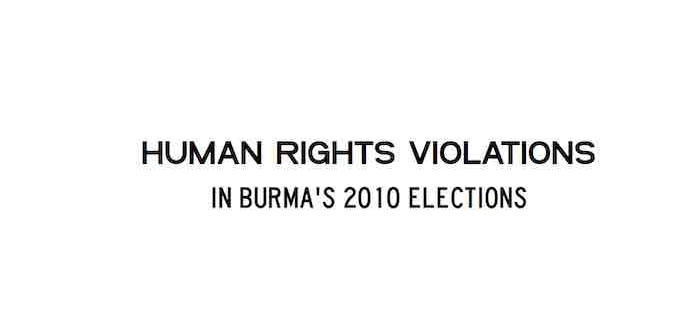Human Rights Violations in Burma’s 2010 Elections
The Network for Human Rights Documentation – Burma (ND-Burma) includes 12 member organizations, collectively using the truth of what communities in Burma have endured to challenge the regime’s impunity for human rights violations through advocacy and to prepare for a peaceful democratic transition.
Despite these restrictive conditions, human rights groups, political organizations, media and ethnic groups from both inside and outside of Burma (including ND- Burma) managed to collect information on violations related to the 2010 elections. As a human rights network, ND-Burma monitored the elections primarily in terms of human rights violations. The fi ndings of this report demonstrate the elections-related human rights violations are consistent with the ongoing violations committed by the military personnel and their proxies as they carry out military campaigns, as they secure areas for development projects, and whenever and wherever civilians dare to challenge the military’s illegitimate authority. The human rights violations committed by the regime and its proxies during and just after Election Day did not have the same intensity as the 2003 massacre at Depeyin, the attacks on villages in eastern Burma, or the beating and killing of monks during the crackdown on demonstrations in September 2007. Any authoritarian regime that exercises repression effectively does not need dramatic violence on Election Day to guarantee its desired results. It will have controlled the process suffi ciently already.
The SPDC used repressive elections laws and severe restrictions on the freedom of assembly and expression so that severe elections-day violence was unnecessary. On Election Day, members of the Union Solidarity and Development Party (USDP), the political party backed by the ruling State Peace and Development Council (SPDC), committed violations, such as interfering with the voting process by entering into polling stations, threatening and forcing people to vote for USDP, and pretending to help elderly people in order to manipulate their votes for USDP.
Furthermore, in ethnic regions where the regime was confi dent that residents would not vote in their favor, USDP withheld voting cards and arranged for advance votes to go to their party. Political parties that contested the elections stated their intention to fi le complaints regarding the misuse of early voting to the Union Elections Commission (UEC). Some parties are also preparing to sue the Commission.
The findings of this report indicate that the elections held on 7 November in Burma failed to meet basic standards of free and fair elections.1 USDP used fraud, advance votes, abuse, and other forms of intimidation to win in the elections.
During the elections process, numerous cases of intimidation, threats, coercion, voting fraud, vote stealing, vote rigging, and counting scandals occurred. Furthermore, strict prohibitions against elections observers, neglect of disagreements and complaints, abuse of state revenue, failure to uphold internationally-recognized elections standards, purposefully making inaccurate voter lists, unlawful canvassing, and impediments to free media’s access to elections-related information occurred nationwide.
This report, along with those published by other human rights monitoring groups and media organizations, amplify the voices from the people of Burma to expose unfairness, to reveal the truth, and to defy unjust rules.


